Ruqyah with Transliteration [01162011] - AlHuda Sisters
Ruqyah with Transliteration [01162011] - AlHuda Sisters
Ruqyah with Transliteration [01162011] - AlHuda Sisters
You also want an ePaper? Increase the reach of your titles
YUMPU automatically turns print PDFs into web optimized ePapers that Google loves.
Al <strong>Ruqyah</strong><br />
Protective and Healing Supplications from the Quran<br />
and Sunnah<br />
Email Address: alhuda.sisters@gmail.com | Blog: alhudasisters.wordpress.com
<strong>Ruqyah</strong> <br />
Definition <br />
Ar-‐<strong>Ruqyah</strong> : A formula (consisting of supplications and may also include <br />
light spitting) employed by the one who is struck by disease like being poisoned <br />
or Jinn possession, etc. and other than that from the various diseases. (Ibnul <br />
Atheer) <br />
Types of <strong>Ruqyah</strong> <br />
There are two types of <strong>Ruqyah</strong>: Legislative <strong>Ruqyah</strong> <br />
and the <br />
polytheistic <strong>Ruqyah</strong> , which is forbidden. The legislative <strong>Ruqyah</strong> must <br />
fulfill the following conditions: <br />
1. That it is a <strong>Ruqyah</strong> using the Words of Allah the Most High, or by His <br />
Names & Attributes, or using Prophetic du'aas (supplications) <br />
2. That it is (recited) in the Arabic language or by what (ever language) it's <br />
meanings are known. <br />
3. That the (the patient) believes that the <strong>Ruqyah</strong> itself cannot effect him but <br />
that the effectiveness is from Allah the Most High, and; <br />
4. That the <strong>Ruqyah</strong> does not (contain) any prohibited feature; the <strong>Ruqyah</strong> is <br />
not performed during janaabah (major impurity), or in a grave or toilet. <br />
Ibn Hajr said (Fath 10/206) "The Scholars have agreed upon the permissibility <br />
of <strong>Ruqyah</strong> when these conditions are all met." (Refer to Ar-‐Ruqiyatush-‐<br />
Shar'eeyah, D. Abdullah at-‐Tayyaar, p.79) <br />
<br />
-‐ 1 -‐
Evidences from the Qur'aan and Sunnah <br />
The evidence for using Qur'aan for <strong>Ruqyah</strong> and its effectiveness in treating both <br />
physical and spiritual diseases is established in the statement of Allah: <br />
"And We send down of the Qur'ân that which is a healing and a mercy to those <br />
who believe" (Al-‐'Isrā', 17:82) <br />
The practice of <strong>Ruqyah</strong> pre-‐dates the appearance of Islam in the Arabian <br />
Peninsula and was refined and purified by the Prophet<br />
. In one Hadeeth, a <br />
family from the Companions came to the Prophet and read to him a <strong>Ruqyah</strong>, <br />
seeking his approval, which they employed for scorpion stings. After hearing the <br />
<strong>Ruqyah</strong> and seeing that it contained nothing polytheistic, the Prophet said: "I <br />
see no harm in it, whoever among you is able to help his brother, should do so." <br />
(Bukhaaree) <br />
This incident was likely to be in response to his saying: "Show me your <strong>Ruqyah</strong>s, <br />
there is no harm in <strong>Ruqyah</strong> as long as there is no Shirk in it." (Muslim 5457) <br />
“For any disease there is a cure, and when the cure matches the disease, the <br />
person recovers by the will of Allah...” (Related by Muslim) <br />
<br />
-‐ 2 -‐
Narrated Abu Hurairah (radi Allahu anhu) that the Prophet said: “There is no <br />
disease that Allah has sent down except that He also has sent down its <br />
treatment.” (The Book of Medicine: Sahih Bukhari) <br />
Narrated 'Aisha: The Prophet ordered me or somebody else to do Ruqya (if <br />
there was danger) from an evil eye. (Sahih Bukhari: Volume 7, Book 71, Number <br />
634) <br />
Narrated Um Salama: that the Prophet saw in her house a girl whose face had <br />
a black spot. He said. "She is under the effect of an evil eye; so treat her <strong>with</strong> a <br />
Ruqya." (Sahih Bukhari: Volume 7, Book 71, Number 635) <br />
Narrated Al-‐Aswad: I asked 'Aisha about treating poisonous stings (a snake-‐bite <br />
or a scorpion sting) <strong>with</strong> a Ruqya. She said, "The Prophet allowed the <br />
treatment of poisonous sting <strong>with</strong> Ruqya." (Sahih Bukhari: Volume 7, Book 71, <br />
Number 637) <br />
<br />
-‐ 3 -‐
With regard to the hadeeth narrated by Muslim (220), according to which the <br />
Prophet (peace and blessings of Allaah be upon him) described the seventy <br />
thousand of this ummah who will enter Paradise <strong>with</strong>out being brought to <br />
account or punished, and in which it says: “They are those who did not recite <br />
ruqyah or ask for ruqyah to be done, and they did not believe in bad omens and <br />
they put their trust in their Lord” – the phrase “they did not recite ruqyah” is the <br />
words of the narrator, not of the Prophet (peace and blessings of Allaah be upon <br />
him). Hence al-‐Bukhaari narrated this hadeeth (no. 5420) and he did not <br />
mention this phrase. <br />
Shaykh al-‐Islam Ibn Taymiyah (may Allaah have mercy on him) said: <br />
These people are praised because they did not ask anyone to recite ruqyah for <br />
them, and ruqyah is a type of du’aa’, so they did not ask others to pray for them. <br />
The phrase “and they did not recite ruqyah” which is mentioned in the <br />
hadeeth is a mistake (on the part of the narrator), for their ruqyah for <br />
themselves and for others is a good deed. The Prophet (peace and blessings of <br />
Allaah be upon him) recited ruqyah for himself and for others; he did not ask <br />
anyone to recite ruqyah for him. His reciting ruqyah for himself and others was <br />
like his making du’aa’ for himself and others; this is something that is enjoined, <br />
for all the Prophets asked of Allaah and prayed to Him, as Allaah tells us in the <br />
stories of Adam, Ibraaheem, Moosa and others. <br />
(Majmoo’ al-‐Fataawa, 1/182; Ibn al-‐Qayyim (may Allaah have mercy on him) <br />
said: This phrase is inserted in the hadeeth, but it is a mistake on the part of some <br />
of the narrators; Haadi al-‐Arwaah, 1/89) <br />
<br />
-‐ 4 -‐
Protective and Healing Supplications from the Quran and Sunnah <br />
First: Al <strong>Ruqyah</strong> from the Quran <br />
"I seek refuge in Allah from Satan the outcast." <br />
Surat Al-‐Fatiha <br />
Bismillaahir-‐Rahmaanir-‐Raheem. Al-‐Ĥamdu Lillahi Rabbi Al-‐`Ālamīn. Ar-‐Raĥmāni <br />
Ar-‐Raĥīm. Māliki Yawmi Ad-‐Dīn. 'Īyāka Na`budu Wa 'Īyāka Nasta`īn. Ahdinā Aş-‐<br />
Şirāţa Al-‐Mustaqīm. Şirāţa Al-‐Ladhīna 'An`amta `Alayhim Ghayri Al-‐Maghđūbi <br />
`Alayhim Wa Lā Ađ-‐Đāllīn. <br />
<br />
-‐ 5 -‐
"In the Name of Allâh, the Most Gracious, the Most Merciful. All the praises and <br />
thanks be to Allâh, the Lord of the 'Alamîn (mankind, jinn and all that exists). <br />
The Most Gracious, the Most Merciful. The Only Owner (and the Only Ruling <br />
Judge) of the Day of Recompense (i.e. the Day of Resurrection). You (Alone) we <br />
worship, and You (Alone) we ask for help (for each and everything). Guide us to <br />
the Straight Way. The Way of those on whom You have bestowed Your Grace, not <br />
(the way) of those who earned Your Anger (such as the Jews), nor of those who <br />
went astray (such as the Christians)." <br />
Ayat al-‐Kursi (2:255) <br />
Allaahu laa 'ilaaha 'illaa Huwal-‐Hayyul-‐Qayyoom, laa ta'khuthuhu sinatun wa laa <br />
nawm, lahu maa fis-‐samaawaati wa maafil-‐'ardh, man thal-‐lathee yashfa'u <br />
'indahu 'illaa bi'ithnih, ya'lamu maa bayna 'aydeehim wa maa khalfahum, wa laa <br />
yuheetoona bishay'im-‐min 'ilmihi 'illaa bimaa shaa'a, wasi'a kursiyyuhus-samaawaati<br />
wal'ardh, wa laa ya'ooduhu hifdhuhumaa, wa Huwal-‐'Aliyyul-‐ <br />
'Adheem. <br />
<br />
-‐ 6 -‐
"Allah! There is none worthy of worship but He, the Ever Living, the One Who <br />
sustains and protects all that exists. Neither slumber nor sleep overtakes Him. <br />
To Him belongs whatever is in the heavens and whatever is on the earth. Who is <br />
he that can intercede <strong>with</strong> Him except <strong>with</strong> His Permission? He knows what <br />
happens to them in this world, and what will happen to them in the Hereafter. <br />
And they will never compass anything of His Knowledge except that which He <br />
wills. His Throne extends over the heavens and the earth, and He feels no fatigue <br />
in guarding and preserving them. And He is the Most High, the Most Great." <br />
Surat Al-‐Baqarah (2:285 & 2:286) <br />
<br />
-‐ 7 -‐
'Aamanar-‐Rasoolu bimaa 'unzila mir-‐Rabbihi walmu'minoon, kullun 'aamana <br />
billaahi wa malaa'ikatihi wa Kutubihi wa Rusulihi, laa nufarriqu bayna 'ahadim-mir-‐Rusulihi,<br />
wa qaaloo sami'naa wa 'ata'naa ghufraanaka Rabbanaa wa 'ilaykal-maseer.<br />
Laa yukallifullaahu nafsan 'illaa wus'ahaa, lahaa maa kasabat wa <br />
'alayhaa mak-‐tasabat, Rabbanaa laa tu'aakhithnaa 'in naseenaa 'aw 'akhta'naa, <br />
Rabbanaa wa laa tahmil 'alaynaa 'isran kamaa hamaltahu 'alal-‐latheena min <br />
qablinaa, Rabbanaa wa laa tuhammilnaa maa laa taaqata lanaa bihi, wa'fu <br />
'annaa, waghfir lanaa warhamnaa, 'Anta Mawlaanaa fansurnaa 'alal-‐qawmil-kaafireen.<br />
<br />
"The Messenger believes in what has been sent down to him from his Lord, and <br />
so do the believers. Each one believes in Allah, His Angels, His Books, and His <br />
Messengers. They say: “We make no distinction between any of His Messengers,” <br />
and they say: “We hear, and we obey. (We seek) Your Forgiveness, our Lord, and <br />
to You is the return.” Allah burdens not a person beyond what he can bear. He <br />
gets reward for that (good) which he has earned, and he is punished for that <br />
(evil) which he has earned. Our Lord! Punish us not if we forget or fall into error. <br />
Our Lord! Lay not on us a burden like that which You did lay on those before us. <br />
Our Lord! Put not on us a greater burden than we have strength to bear. Pardon <br />
us and grant us forgiveness. Have mercy on us. You are our Protector, and help <br />
us against the disbelieving people." <br />
Surat Al-‐Ikhlas (3 Times) <br />
Bismillaahir-‐Rahmaanir-‐Raheem. Qul Huwallaahu 'Ahad. Allaahus-‐Samad. Lam <br />
yalid wa lam. yoolad. Wa lam yakun lahu kufuwan 'ahad. <br />
"Say: He is Allah (the) One. The Self-‐Sufficient Master, Whom all creatures need, <br />
He begets not nor was he begotten, and there is none equal to Him." <br />
<br />
-‐ 8 -‐
Surat Al-‐Falaq (3 Times) <br />
Bismillaahir-‐Rahmaanir-‐Raheem. Qul 'a'oothu birabbil-‐falaq. Min sharri maa <br />
khalaq. Wa min sharri ghaasiqin 'ithaa waqab. Wa min sharrin-‐naffaathaati fil-‐<br />
'uqad. Wa min sharri haasidin 'ithaa hasad. <br />
"Say: I seek refuge <strong>with</strong> (Allah) the Lord of the daybreak, from the evil of what <br />
He has created, and from the evil of the darkening (night) as it comes <strong>with</strong> its <br />
darkness, and from the evil of those who practice witchcraft when they blow in <br />
the knots, and from the evil of the envier when he envies." <br />
<br />
-‐ 9 -‐
Surat An-‐Nas (3 Times) <br />
Bismillaahir-‐Rahmaanir-‐Raheem. Qul 'a'oothu birabbin-‐naas. Malikin-‐naas. <br />
'Ilaahin-‐naas. Min sharril-‐waswaasil-‐khannaas. Allathee yuwaswisu fee sudoorin-naas.<br />
Minal-‐jinnati wannaas. <br />
"Say: I seek refuge <strong>with</strong> (Allah) the Lord of mankind, the King of mankind, the <br />
God of mankind, from the evil of the whisperer who <strong>with</strong>draws, who whispers in <br />
the breasts of mankind, of jinns, and men." <br />
<br />
-‐ 10 -‐
Second: Al <strong>Ruqyah</strong> from the Prophet’s <br />
Sunnah <br />
A’oodhu Billaah il-‐samee’ il-‐‘aleem min al-‐Shaytaan ir-‐rajeem wa min hamzihi wa <br />
nafakhihi wa nafthihi. <br />
"I seek refuge <strong>with</strong> Allah, the All-‐Hearing, the All-‐Knowing, from the accursed <br />
Satan, from his madness, his arrogance, and his poetry." (Tirmidhi, Abu Dawood) <br />
'U'eethukumaa bikalimaatil-‐laahit-‐taammati min kulli shaytaanin wa haammatin, <br />
wa min kulli 'aynin laammatin. <br />
"I seek protection for you in the Perfect Words of Allah from every devil and <br />
every beast, and from every envious blameworthy eye." (Sahih al-‐Bukhari) <br />
Note: If you are doing for yourself, say a’oodhu <br />
minus kuma. <br />
'A'oothu bikalimaatil-‐laahit-‐taammaati min sharri maa khalaqa. <br />
"I seek refuge in the Perfect Words of Allah from the evil of what He has <br />
created." (Muslim) <br />
<br />
-‐ 11 -‐
Bismillaahil-‐lathee laa yadhurru ma'as-‐mihi shay'un fil-‐'ardhi wa laa fis-‐samaa'i <br />
wa Huwas-‐Samee 'ul-‐ 'Aleem. <br />
"In the Name of Allah, Who <strong>with</strong> His Name nothing can cause harm in the earth <br />
nor in the heavens, and He is the All-‐Hearing, the All-‐Knowing." (3 Times) (Abu <br />
Dawood, at-‐Tirmidhi) <br />
Bismillaah. 'A'oothu billaahi wa qudratihi min sharri maa 'ajidu wa 'uhaathiru. <br />
"In the Name of Allah." (3 Times) "I seek refuge in Allah and in His Power from <br />
the evil of what I find and of what I guard against. " (7 Times) (Muslim) <br />
Bismillahi arqika, min kulli shay'in yu'dhika, min sharri kulli nafsin aw `ayni hasidi, <br />
Allahu yashfika, bismillahi arqika. <br />
"In the Name of Allah I pray over you for healing (<strong>Ruqyah</strong>), from everything that <br />
bothers you, from the evil of every soul and every evil eye that hates you, may <br />
Allah cure you, in the Name of Allah I pray over you for healing.'' (Muslim) <br />
<br />
-‐ 12 -‐
Bismillahi yubrika min kulli da’in yushfik wa min sharri hasidin ‘iza hasada wa <br />
min sharri kulli dhi ’ayn. <br />
"In the name of Allah. He may cure you from all kinds of illness and safeguard <br />
you from the evil of a jealous one when he feels jealous and from the evil <br />
influence of eye." (Sahih Muslim) <br />
As'alullahal-‐`Azima Rabbal-‐`Arshil-‐`Azimi, an yashfiyaka. <br />
"I ask Allah Almighty, Lord of the Magnificent Throne, to make you well." (7 <br />
Times) (Abu Dawud, at-‐Tirmidhi) <br />
Laa 'ilaaha 'illallaahul-‐'Adheemul-‐Haleem, laa 'ilaaha 'illallaahu Rabbul-‐'Arshil-‐<br />
'Adheem, laa 'ilaaha 'illallaahu Rabbus-‐samaawaati wa Rabbul-‐'ardhi wa Rabbul-‐<br />
'Arshil-‐Kareem. <br />
"There is no god but Allah, the All-‐Powerful, the Forbearing; there is no god but <br />
Allah, Lord of the mighty Throne; there is no god but Allah, Lord of heaven, Lord <br />
of earth, and Lord of the noble Throne." (Sahih al-‐Bukhari, Sahih Muslim) <br />
<br />
-‐ 13 -‐
Yaa Thal-‐Jalaali wal-‐'Ikraam, yaa Hayyu yaa Qayyoomu birahmatika <br />
'astagheethu. <br />
"O the Lord of Glory and Honor, O Ever Living One, O Eternal One, I seek help <br />
through Your mercy." (At-‐Tirmidhi) <br />
Allahumma adhhibil-‐ba'sa, Rabban-‐nasi, ishfi, Antash-‐Shafi, la shifa'a illa <br />
shifa'uka, shifaan la yughadiru saqaman. <br />
"O Allah, Lord of the people, take away the disease and cure him; You are the <br />
One Who cures and there is no cure except Your Cure – a cure that leaves no <br />
disease." (Al-‐Bukhari, Muslim) <br />
Allaahumma 'aafinee fee badanee, Allaahumma 'aafinee fee sam'ee, Allaahumma <br />
'aafinee fee basaree, laa 'ilaaha 'illaa 'Anta. <br />
"O Allah, make me healthy in my body. O Allah, preserve for me my hearing. O <br />
Allah, preserve for me my sight. There is none worthy of worship but You." (3 <br />
Times) (Abu Dawood) <br />
<br />
-‐ 14 -‐
Allaahumma 'innee 'as'alukal-‐'afwa wal'aafiyata fid-‐dunyaa wal'aakhirati, <br />
Allaahumma 'innee 'as'alukal-‐'afwa wal'aafiyata fee deenee wa dunyaaya wa <br />
'ahlee, wa maalee, Allaahum-‐mastur 'awraatee, wa 'aamin raw'aatee, Allaahum-mahfadhnee<br />
min bayni yadayya, wa min khalfee, wa 'an yameenee, wa 'an <br />
shimaalee, wa min fawqee, wa 'a'oothu bi'adhamatika 'an 'ughtaala min tahtee. <br />
"O Allah, I seek Your forgiveness and Your protection in this world and the next. <br />
O Allah, I seek Your forgiveness and Your protection in my religion, in my <br />
worldly affairs, in my family, and in my wealth. O Allah, conceal my secrets and <br />
preserve me from anguish. O Allah, guard me from what is in front of me and <br />
behind me, from my left, and from my right, and from above me. I seek refuge in <br />
Your Greatness from being struck down from beneath me." (Abu Dawood) <br />
Allaahummahdinee, warzuqnee, wa 'aafinee, warhamnee. <br />
"O Allah guide me, provide for me, protect me, and have mercy on me." (Sahih <br />
Muslim) <br />
<br />
-‐ 15 -‐
Allaahumma rahmataka 'arjoo falaa takilnee 'ilaa nafsee tarfata 'aynin, wa 'aslih <br />
lee sha'nee kullahu, laa'ilaaha 'illaa 'Anta. <br />
"O Allah, I hope for Your Mercy. Do not leave me to myself even for the blinking <br />
of an eye. Correct all of my affairs for me. There is none worthy of worship but <br />
You." (Abu Dawood) <br />
Allahumma innâ nas’aluka min khayri ma sa’alaka minhu nabiyyuka <br />
Muhammadun sallallâhu alayhi wasallam, na’aüdhu bika min sharri <br />
masta’adhaka minhu nabiyyuka Muhammadun sallallâhu alayhi wasallam, wa <br />
antal musta’anu wa alaykul balaghu wala hawla wala quwwata ilIâ billah. <br />
"O Allah! We seek all what is good, what has been asked for by Your Prophet <br />
Muhammad We seek Your refuge from all what is evil, from what has Your <br />
refuge been sought for by Your Prophet Muhammad . You are the only helper <br />
who is asked for help and it is for You to accomplish our prayers. There is no <br />
strength or power except <strong>with</strong> Allah." (At-‐Tirmidhi) <br />
<br />
-‐ 16 -‐
Allaahumma salli 'alaa Muhammadin wa 'alaa 'aali Muhammadin, kamaa sallayta <br />
'alaa 'Ibraaheema wa 'alaa 'aali 'Ibraaheema, 'innaka Hameedun Majeed. <br />
Allaahumma baarik 'alaa Muhammadin wa 'alaa 'aali Muhammadin, kamaa <br />
baarakta 'alaa 'Ibraaheema wa 'alaa 'aali 'Ibraaheema, 'innaka Hameedun <br />
Majeed. <br />
"O Allah, bestow Your favor on Muhammad and on the family of Muhammad as <br />
You have bestowed Your favor on Ibrahim and on the family of Ibrahim, You are <br />
Praiseworthy, Most Glorious. O Allah, bless Muhammad and the family of <br />
Muhammad as You have blessed Ibrahim and the family of Ibrahim, You are <br />
Praiseworthy, Most Glorious." (Bukhari) <br />
<br />
-‐ 17 -‐
Hadith on the Virtues of <strong>Ruqyah</strong> <strong>with</strong> Allah’s Book <br />
'Aishah (RA) reported that Allah's Messenger came into her house and saw <br />
<strong>with</strong> her a woman who was treating her <strong>with</strong> ruqyah. He told her: ‘Treat her <br />
(only) <strong>with</strong> Allah's Book.’ (Recorded by Ibn Hibban; verified to be authentic by al-‐<br />
Albani in as-‐Sahihah no. 1931) <br />
“With regard to the du’aa’ that is prescribed for the Muslim to say if he wants to <br />
recite <strong>Ruqyah</strong> for himself or for someone else, there are many such du’aa’s, the <br />
greatest of which are al-‐Faatihah and al-‐Mi’wadhatayn.” 1 <br />
<strong>Ruqyah</strong> <strong>with</strong> Surah Al-‐Fatiha <br />
Surah al Fatihah is also named ar-‐Ruqya, the Spiritual Cure due to the hadeeth of <br />
Abu Sa`eed (RA) reported in Saheeh Bukhaaree that after he had recited it to <br />
cure a person who had been bitten by a scorpion, the Messenger of Allaah <br />
said to him, And what made you to know that it was a ruqya? (Saheeh Bukhaaree: <br />
Eng. Trans. 3/264 no. 476) <br />
There is a cure for everything in the “Opening of the Book.” [Surah Al-‐Fatihah]. <br />
(Al-‐Baihaqi and Ad-‐Darimi) <br />
1<br />
http://www.islamqa.com/en/ref/3476/ruqyah <br />
<br />
-‐ 18 -‐
<strong>Ruqyah</strong> <strong>with</strong> Al-‐Muawwidhat <br />
‘Aishah (RA) reported: "When Allah's Messenger went to bed, he would bring <br />
the palms of both hands together, and blow into them while reading "Qul huwa <br />
Allahu ahad" 112, "Qul a’udhu bi rabb il-‐falaq" 113, "Qul a’udhu bi rabbi n-‐Nas" <br />
114. He would then rub <strong>with</strong> them whatever he could reach of his body, starting <br />
<strong>with</strong> his head, face, and the front part of his body. He would do this three times. <br />
When he got very ill, he asked me to do that for him." (Al Bukhari, Muslim) <br />
‘Aishah (RA) also reported: "In the final sickness in which he passed away, the <br />
Prophet used to blow over himself <strong>with</strong> al-‐Mu’awwidhat. When he became <br />
very ill, I blew <strong>with</strong> them for him, rubbing over him <strong>with</strong> his own hand because <br />
of the blessing in it." (Al Bukhari, Muslim) <br />
<br />
-‐ 19 -‐
<strong>Ruqyah</strong> <strong>with</strong> Ayat al-‐Kursi <br />
Ubayy Bin Ka'b narrated that he had a harvest of dates. He noticed that it shrunk <br />
every day, and decided to watch it at night. He did and noticed a beast that <br />
looked like a boy who attained puberty. He gave him salam, and it responded to <br />
him <strong>with</strong> salam. <br />
He asked it, "Are you human or jinn" <br />
It replied, "Jinn." <br />
He told it, "Show me your hand." <br />
It showed him its hand, and he saw that it looked like a dog's, <strong>with</strong> fur like that of <br />
a dog covering it. He exclaimed, "Is this how jinn are like!?" It then told him, "All <br />
jinns know that there is no one among them stronger than me." He asked it, <br />
"What brought you here?" It replied, "We have been informed that you like to <br />
give charity, so we came to get some of your food." He asked it, "What would <br />
protect us from you?" It replied, "This ayah from Surat ul-‐Baqarah: (Allahu la <br />
ilaha illa huwa Al-‐Hayy ul-‐Qayyum,) (2/255) -‐ whoever says it in the <br />
evening will be protected from us until the morning, and whoever says it in the <br />
morning will be protected from us until the evening." <br />
In the morning, Ubayy came to Allah's Messenger and told him of that <br />
incident. He told him, ‘The evil one has said the truth!’ (Recorded by an-‐Nasa’i <br />
and others. Verified to be authentic by al-‐Albani) <br />
<strong>Ruqyah</strong> <strong>with</strong> the Last Two Verses of Surat al-‐Baqarah <br />
At-‐Tirmidhi reported that an-‐Nu’man ibn Bashir (RA) narrated that Allah’s <br />
Messenger said: “Verily! Allah has written a Book before the creation of the <br />
heavens and earth by two thousand years. He has descended from it two Verses <br />
by which He ended Surat al-‐Baqarah, and if they are recited in a house, Shaytaan <br />
will not come close to that house for three nights." (Authenticated by al-‐Albani in <br />
Sahih at-‐Tirmidhi no. 2882) <br />
Al-‐Bukhari recorded that Ibu Masud (RA) said that the Messenger of Allah <br />
said: "Whoever recites the last two Ayat of Surat al-‐Baqarah at night, they will <br />
suffice him." (Fath Al-‐Bari 8:672) <br />
<br />
-‐ 20 -‐
Abu Dhar (RA) narrated that Allah's Messenger said: "I was given the last <br />
Verses of Surat al-‐Baqarah which are from a treasure under the Throne (of <br />
Allah); they were not given to any Prophet before me." (Sahih al-‐Jamie' no. 1060) <br />
<br />
-‐ 21 -‐
Hadith on the Virtues of Some Sunnah Duas <br />
It was narrated that Ibn ‘Abbaas (may Allaah be pleased <strong>with</strong> him) said: The <br />
Prophet used to seek refuge for al-‐ Hasan and al-‐Husayn, and he would say: <br />
“Your father [meaning Ibraaheemm peace be upon him] used to seek refuge <strong>with</strong> <br />
Allaah for Ismaa’eel and Ishaaq <strong>with</strong> these words: <br />
A’oodhu bi kalimaatil-‐laahit-‐taammah min kulli shaytaanin wa haammah wa min <br />
kulli ‘aynin laammah (I seek refuge in the perfect words of Allaah, from every <br />
devil and every poisonous reptile, and from every evil eye).’” (Narrated by al-‐<br />
Bukhaari, 3191) <br />
Note: If you are doing for yourself, say a’oodhu <br />
minus kuma. <br />
Abu `Abdullah bin Abul-‐`as (May Allah be pleased <strong>with</strong> him) reported: I <br />
complained to the Messenger of Allah about a pain I had in my body. The <br />
Messenger of Allah said, "Place your hand where you feel pain and say: <br />
`Bismillah (With the Name of Allah)' three times; and then repeat seven times: <br />
`A`udhu bi`izzatillahi wa qudratihi min sharri ma ajidu wa `uhadhiru (I seek <br />
refuge <strong>with</strong> Allah and <strong>with</strong> His Power from the evil that afflicts me and that <br />
which I apprehend).''' (Muslim) <br />
<br />
-‐ 22 -‐
Commentary: This Hadith tells us it is not necessary that a patient should <br />
exclusively get <strong>Ruqyah</strong> from others; rather he can also do <strong>Ruqyah</strong> himself by <br />
reciting the Prophet's supplications. 2 <br />
Abu Sa`id Al-‐Khudri (May Allah be pleased <strong>with</strong> him) reported: Jibril (Gabriel) <br />
came to the Prophet and said: "O Muhammad ! Do you feel sick?'' He <br />
said, "Yes.'' Jibril supplicated thus (i.e., he performed <strong>Ruqyah</strong>): <br />
"Bismillahi arqika, min kulli shay'in yu'dhika, min sharri kulli nafsin aw `ayni <br />
hasidi, Allahu yashfika, bismillahi arqika. [With the Name of Allah. I recite over <br />
you (to cleanse you) from all that troubles you, and from every harmful mischief <br />
and from the evil of the eyes of an envier. Allah will cure you; and <strong>with</strong> the Name <br />
of Allah, I recite over you].'' (Muslim) <br />
Commentary: This Hadith clearly tells us that the Prophet was not free from <br />
the basic attributes of human nature and occasionally he also fell ill. Angel Jibril <br />
(Gabriel) therefore prayed for his health and safety against all those things <br />
which could harm him. These prayers should be recited after the Prophet's <br />
practice. 3 <br />
Ibn `Abbas (May Allah be pleased <strong>with</strong> them) reported: The Prophet said, "He <br />
who visits a sick person who is not on the point of death and supplicates seven <br />
times: <br />
As'alullahal-‐`Azima Rabbal-‐`Arshil-‐`Azimi, an yashfiyaka (I beseech Allah the <br />
Great, the Rubb of the Great Throne, to heal you), Allah will certainly heal him <br />
from that sickness.'' (Abu Dawud, At-‐Tirmidhi) <br />
Commentary: There is always a great certainty that Allah will respond to a <br />
supplication which springs from a sincere, veracious heart. One should, <br />
therefore, pray for a patient <strong>with</strong> full conviction and reassurance of heart. <br />
2<br />
Riyad-‐us-‐Saliheen <br />
3<br />
Riyad-‐us-‐Saliheen <br />
<br />
-‐ 23 -‐
Moreover, the Prophet's prayers have special effect and grace and therefore <br />
their original wordings should be uttered. 4 <br />
`Aishah (May Allah be pleased <strong>with</strong> her) reported: When the Prophet visited <br />
any ailing member of his family, he would touch the sick person <strong>with</strong> his right <br />
hand and would supplicate: <br />
"Allahumma adhhibil-‐ba'sa, Rabban-‐nasi, ishfi, Antash-‐Shafi, la shifa'a illa <br />
shifa'uka, shifaan la yughadiru saqaman [O Allah! the Rubb of mankind! Remove <br />
this disease and cure (him or her)! You are the Great Curer. There is no cure but <br />
through You, which leaves behind no disease].'' (Al-‐Bukhari, Muslim) <br />
Abdullah bin Amr bin Al-‐'As (radi Allahu anhu) reported that he heard the <br />
Prophet saying, "If anyone invokes blessings upon me once, Allah will bestow <br />
blessings upon him ten times over." (Muslim) <br />
Ibn Mas'ud (radi Allahu anhu) reported that the Prophet said, "The people <br />
nearest to me on the Day of Judgment will be the ones most conscientious in <br />
invoking blessings upon me." (Tirmidhi reported this hadith, and he considers it a <br />
sound hadith) <br />
4<br />
Riyad-‐us-‐Saliheen <br />
<br />
-‐ 24 -‐
More Supplications for the Sick <br />
Sa`d bin Abu Waqqas (May Allah be pleased <strong>with</strong> him) reported: The Messenger <br />
of Allah visited me during my illness and supplicated, <br />
"O Allah! Cure Sa`d. O Allah! Cure Sa`d. O' Allah! Cure Sa`d.'' (Muslim) <br />
Commentary: To pray for the health and recovery of the patient, particularly <br />
uttering his name, is commendable. Furthermore, one should repeatedly pray to <br />
Allah and beseech Him <strong>with</strong> supplication till He responds. 5 <br />
Ibn `Abbas (May Allah be pleased <strong>with</strong> them) reported: The Prophet visited a <br />
bedouin who was sick. Whenever he visited an ailing person, he would say, <br />
"La ba'sa, tahurun in sha' Allah [No harm, (it will be a) purification (from sins), if <br />
Allah wills].'' (Al-‐Bukhari) <br />
Commentary: According to this Hadith, a patient should be told that his disease <br />
will purge out his sins. To sit beside the sick, to comfort his heart and to say a <br />
few words of sympathy to him was the Prophet's practice. 6 <br />
5<br />
Riyad-‐us-‐Saliheen <br />
6<br />
Riyad-‐us-‐Saliheen <br />
<br />
-‐ 25 -‐
Abu Sa`id Al-‐Khudri and Abu Hurairah (May Allah be pleased <strong>with</strong> them) <br />
reported: The Messenger of Allah said, "If a person says: <br />
`La ilaha illallahu wallahu Akbar (There is no true god except Allah and Allah is <br />
Greatest)', his Rubb responds to him and affirms: `(Yes!) There is no true god <br />
except I, and I am the Greatest.' When he says: <br />
`La ilaha illallahu Wahdahu la sharika Lahu (There is no true god except Allah, <br />
the One, He has no partner).' Allah (subhanahu wa ta'ala) affirms: `(Yes!) There <br />
is no true god except I. I have no partner.' When he says: <br />
`La ilaha illallahu Lahul mulku wa Lahul-‐hamdu (the sovereignty belongs to Him <br />
and all the praise is due to Him).' He (subhanahu wa ta'ala) affirms: `(Yes!) There <br />
is no true god except I, Mine is the praise and to Me belongs the sovereignty.' <br />
When he says: <br />
`La ilaha illallahu wa la hawla wa la quwwata illa Billah (There is no true god <br />
except Allah, and there is no might and power but <strong>with</strong> Allah).' He (subhanahu <br />
wa ta'ala) affirms: `(Yes!) There is no true god except I, and there is no might and <br />
power but <strong>with</strong> Me.''' The Messenger of Allah added, "He who recites this <br />
during his illness and dies, will not be touched by the Fire (Hell).'' (At-‐Tirmidhu) <br />
Commentary: This Hadith points out the excellence of the words mentioned <br />
above. This is so because of great meaning they have, namely the firm belief in <br />
Allah, His Oneness and Glorification; that to Him Alone we should return, upon <br />
Him Alone we should rely, and to Him Alone we should express gratefulness. If <br />
somebody utters them during his illness, his life is sure to come to an end in a <br />
good way, that is, he will go to Jannah. 7 <br />
7<br />
Riyad-‐us-‐Saliheen <br />
<br />
-‐ 26 -‐
`Aishah (May Allah be pleased <strong>with</strong> him) reported: When a person complained to <br />
the Prophet about an ailment or suffered from a sore or a wound, the Prophet <br />
would touch the ground <strong>with</strong> his forefinger and then raise it (Sufyan bin <br />
`Uyainah, the narrator, demonstrated this <strong>with</strong> his forefinger) and would recite: <br />
`Bismil-‐lahi, turbatu ardina, biriqati ba`dina, yushfa bihi saqimuni, bi 'idhni <br />
Rabbina' (With the Name of Allah, the dust of our ground mixed <strong>with</strong> the saliva <br />
of some of us would cure our patient <strong>with</strong> the permission of our Rubb).'' (Al-‐<br />
Bukhari, Muslim) <br />
Commentary: The Prophet would put his forefinger on earth and then mix <br />
his spittle <strong>with</strong> the dust sticking to it. Afterwards, he would put it on the <br />
patient's pain-‐spot or wound and utter the said supplication. This simple act <br />
would cure the patient. Some believe that it was peculiar only to the Prophet <br />
and was indeed his miracle because the particular dust was of Al-‐Madinah's soil <br />
<strong>with</strong> the Prophet's spittle being of a unique quality. But Ibn Hajar differs from <br />
this view. Spittle and dust, according to him, are simply external means and the <br />
curative effect in them comes from Allah Alone. Secondly, we may turn to the <br />
pious people to seek their blessings and prayers for the removal of our ailments <br />
and troubles, provided the spiritual treatment is bereft of amulets and other <br />
polytheistic ways. 8 <br />
8<br />
Riyad-‐us-‐Saliheen <br />
<br />
-‐ 27 -‐


![Ruqyah with Transliteration [01162011] - AlHuda Sisters](https://img.yumpu.com/39648886/1/500x640/ruqyah-with-transliteration-01162011-alhuda-sisters.jpg)
![Journey to Eternity Fixed [12232012] - AlHuda Sisters](https://img.yumpu.com/51053423/1/184x260/journey-to-eternity-fixed-12232012-alhuda-sisters.jpg?quality=85)
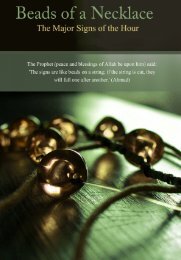
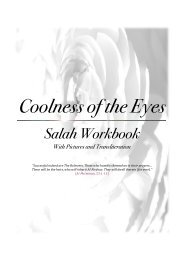
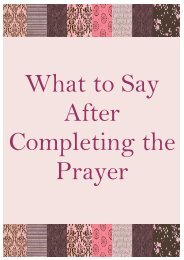
![Final Rites [11292012] - AlHuda Sisters](https://img.yumpu.com/48613568/1/184x260/final-rites-11292012-alhuda-sisters.jpg?quality=85)
![Ruqyah with Transliteration [05302011] - AlHuda Sisters](https://img.yumpu.com/47668779/1/190x245/ruqyah-with-transliteration-05302011-alhuda-sisters.jpg?quality=85)
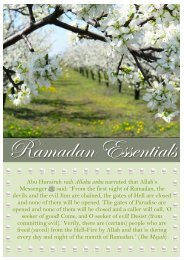
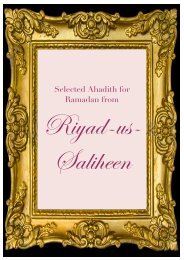

![Ruqyah with Transliteration [07242012] - AlHuda Sisters](https://img.yumpu.com/45657180/1/190x245/ruqyah-with-transliteration-07242012-alhuda-sisters.jpg?quality=85)
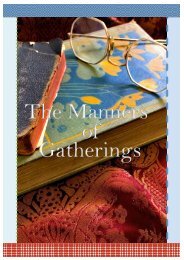
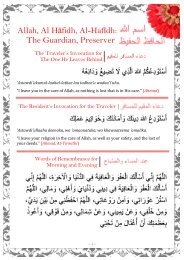
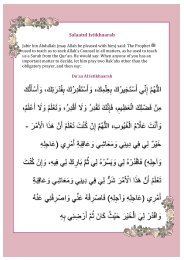
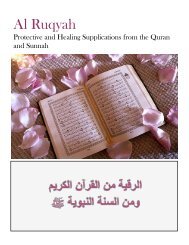
![Precious Remembrance [11232012] - AlHuda Sisters](https://img.yumpu.com/40921168/1/184x260/precious-remembrance-11232012-alhuda-sisters.jpg?quality=85)